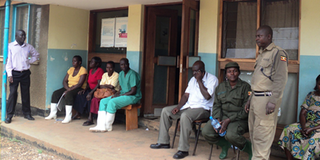Two new Ebola deaths as patients go on strike

Security personnel and Kagadi hospital staff sit outside the facility on Tuesday after patients protested. Photo by Ronald Tumusiime
What you need to know:
Abandoned. Total number of dead rises to 16, RDC engages police to calm protesting patients, Kibaale bans social gatherings as Prisons suspend visits.
The health ministry has announced that two more people died on Tuesday evening of Ebola as reports emerged that patients with the haemorrhagic fever at Kagadi Hospital had gone on strike.
According to a statement from the ministry, signed by Dr Dennis Lwamafa, the two deaths, recorded at Kagadi Hospital in Kibaale District, brings the total number of dead to 16 since the onset of the outbreak in July.
The ministry added that of the patients at Kagadi, two have been confirmed to have Ebola while 16 are under watch as results of tests done on them are awaited from the Uganda Virus Research Institute in Entebbe.
The statement indicated that another 14 samples were on Tuesday taken to Entebbe for study, bringing the total number of samples collected since the outbreak to 30. It added that the ministry is actively following up 176 people who came into contact with the dead or the sick and also asked the public to be vigilant but avoid creating fear. But even as the ministry grapples with figures, Daily Monitor has learnt that it took the intervention of the police to quell patients at the Kagadi isolation facility who were protesting alleged neglect on Tuesday.
The patients, complaining about shortage of food and clean water, reportedly stormed out of the isolation facility in the afternoon, sending health workers scampering.
“Why have you dumped us here without food since Saturday?” yelled one patient, but to no one in particular since the health workers had taken off—fearing physical contact with the patients.
It was not until the deputy RDC, Ms Olivia Kiiza, turned up with two police officers that calm was restored. “Madam please let us go back to our homes because we have no food here,” a patient pleaded with Ms Kiiza. “We just depend in biscuits and Splash (fruit juice).”
In protective gear, Ms Kiiza appealed for calm, promising the patients support. “The patients were serious about going back home,” she told Daily Monitor. “They said they lacked food and no doctor was attending to them. We are asking all well-wishers especially Civil Society Organisations to come to our rescue and donate food.”
The patients’ frustration has also been echoed by the local taskforce set up to monitor and report the outbreak.
Mr Stephen Mfashingabo, the Kibaale District health secretary, who also doubles as the vice chair of the Ebola taskforce, said their reports to Kampala were going unheeded.
“The health minister should desist from making press statements in Kampala. Let them come here and see how the situation is worsening,” he said. “The government has not facilitated doctors to handle this epidemic effectively. The health workers are few and the drug supplies are insufficient.”
Govt response
Last evening, the ministry spokesperson, Ms Rukia Nakamatte, said they would write to the Prime Minister’s office asking for food supplies since they had only received the report of shortages yesterday.
“About doctors, the World Health Organisation has sent a team of nine experts who should be at Kagadi Hospital this (yesterday) evening. On protective gear, we hope to get more supplies by Friday to supplement the few we have now.”
Meanwhile, in a bid to stem the spread of the disease, both Kibaale and Kabarole districts have banned social gatherings like weddings and crusades.
Kibaale chairperson George Namyaka said even markets would be closed until the outbreak is contained.
“This is a preventative measure to minimise new infections,” he said yesterday. Mr Richard Rwabuhinga, the Kabarole District chairman, said they placed the ban because they are close to Kibaale and also border districts like Kyenjojo and Kyegegwa where suspicious cases have been reported.
The district, in preparation for any eventualities, has set up an isolation unit at Kitaraka Health Centre IV in East Division of Fort Portal Municipality.
Dr Charles Olaro, the medical superintendent at Fort Portal hospital, said they chose Kitaraka because it is near the Kyenjojo-Fort Portal Road and would be accessible by nearby districts.
The outbreak has also affected the transport sector with taxi operators noting a decline in passengers visiting the region. Mr Mathias Musoke, a transporter, said fewer people were boarding taxis to Kibaale District from the neighbouring towns, adding: “People even don’t trust us with their goods in fear of being infected.”
==========================
The virus: Ebola virus causes hemorrhagic fevers which are illnesses marked by severe bleeding and organ failure. The Ebola virus lives in animal hosts, and humans can contract the viruses from infected animals. After the initial transmission, the viruses can spread from person to person through contact with body fluids or contaminated needles.
No drug has been approved to treat Ebola virus. People diagnosed with Ebola receive supportive care and treatment for complications.
Symptoms: Signs and symptoms typically begin abruptly within five to 10 days of infection. Early signs and symptoms include:
• Fever
• Severe headache
• Joint and muscle aches
• Chills
• Sore throat
• Weakness
Over time as the illness progresses, symptoms become increasingly severe and may include:
• Nausea and vomiting
• Diarrhea (may be bloody)
• Red eyes
• Raised rash
• Chest pain and cough
• Stomach pain
• Severe weight loss
• Bleeding from the nose, mouth, rectum, eyes and ears



